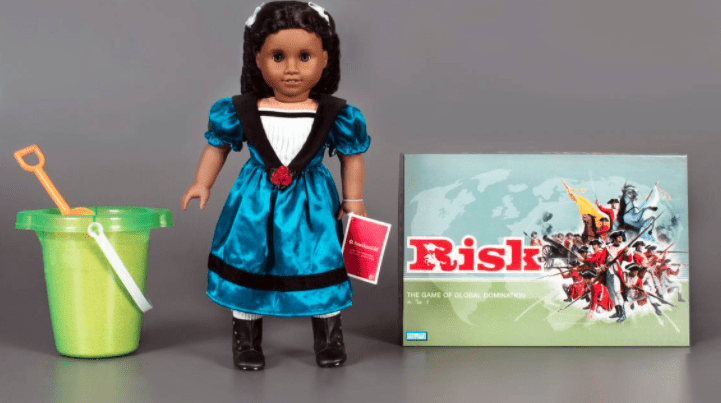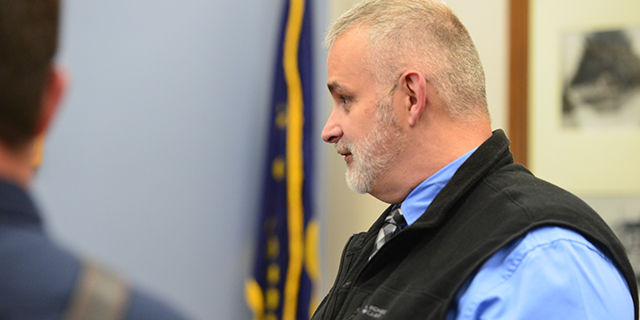News of the weird: American Girl Dolls, Risk, sand make it to Toy Hall of Fame
Published 11:20 am Sunday, November 7, 2021

- This photo, provided by The Strong National Museum of Play, shows the three toys being inducted this year into the National Toy Hall of Fame. They are, from left: sand, The American Girl Doll, and the game of Risk, that are being enshrined during a ceremony at the hall, located inside The Strong National Museum of Play, in Rochester, NY.
ROCHESTER, N.Y. — American Girl dolls and the strategy board game Risk were inducted into the National Toy Hall of Fame on Thursday, Nov. 4, in recognition of their influence on the toy industry. Sand, which the group called perhaps the most universal and oldest toy in the world, was also inducted.
Trending
All three were honored during a ceremony at the hall after winning over a panel of experts who voted for them from a group of 12 finalists.
Also in the running this year were four other competitive games: Battleship, The Settlers of Catan, Mahjong and billiards, as well as Cabbage Patch Kids, Masters of the Universe, Fisher-Price Corn Popper, the toy fire engine and the piñata.
Anyone can nominate a toy but to be considered, they must have withstood tests of time and memory, changed play or toy design and fostered learning, creativity or discovery.
Trending
American Girl dolls, the 1986 creation of educator Pleasant Rowland, were recognized for their exploration of the country’s social and cultural history. The 18-inch historical dolls and accompanying books each offer insights into an era. For example, Molly McIntire is waiting for her father to return home from World War II.
The Truly Me contemporary doll line, with its diversity of skin tones, hair and gender, followed in 1995, letting children choose a doll that looks like them.
Rowland, 80, called the American Girl doll’s inclusion “an incredible honor.”
“I’m so proud of the American Girl family—past and present—who have been faithful stewards of this brand for more than three decades, helping to capture the hearts of an entire generation of girls,” she said in an emailed statement.
“Rowland’s formula for combining doll play with history lessons worked, in her words, like ‘chocolate cake with vitamins,’” curator Michelle Parnett-Dwyer said. “In an era when some education experts claimed that school curriculums paid little attention to history, this toy may well have filled a void.”
Risk, based on the French game Le Conquete du Monde, was first published in the United States in 1959 and continues to influence other board games, hall officials said. It challenges players to control armies and conquer the world on a game board that is a map of continents.
“Risk became one of the most popular board games of all time, inspiring a new corps of passionate gamers, and influencing other games which began the wargaming hobby — and by extension the Euro-games like The Settlers of Catan that many enjoy today,” curator Nicolas Ricketts said.
Sand was honored for its “opportunities for tactical, physical, cooperative, creative, and independent free play,” according to the hall of fame, which is housed inside The Strong Museum of Play in Rochester, New York.
“Children recognize sand as a creative material suitable for pouring, scooping, sieving, raking, and measuring,” it said. “Wet sand is even better, ready for kids to construct, shape, and sculpt.”
“Although some playthings can only be found online or in certain stores, sand has a global reach that most toy manufacturers would envy,” chief curator Chirstopher Bensch said. “It’s been a vehicle for play since prehistory, and anyone who has spent the day at the beach can understand the allure of this toy.”
The class of 2021 joins 74 previous honorees.
Nationwide polio eradication campaign starts in Afghanistan
ISLAMABAD — The Taliban-run Afghan public health ministry announced Sunday, Nov. 7, the start of a four-day nationwide polio vaccination campaign aimed at inoculating children under age 5.
For the past three years before taking control of Afghanistan, the Taliban had barred U.N.-organized vaccination teams from doing door-to-door campaigns in parts of the country under their control. The group apparently was suspicious the team members could be spies for the previous government or the West.
Because of the ban and ongoing fighting, some 3.3 million children over the past three years have not been vaccinated.
“Without any doubt polio is a disease that without treatment will either kill our children or cause them with permanent disability, so in this case the only way is to implement the vaccination,” said Dr. Qalandar Ebad, the Taliban’s acting public health minister.
Afghanistan and neighboring Pakistan are the only countries in the world where polio remains endemic and the disease can cause partial paralysis in children. Since 2010, the country has been carrying out regular inoculation campaigns in which workers go door to door, giving the vaccine to children. Most of the workers are women, since they can get better access to mothers and children.
The four-day campaign started Nov. 8 and take place countrywide, Ebad said. The estimated target population is Afghanistan’s 10 million children under age 5, including the more than 3.3 million who could not be reached since 2018.
“Vaccination of (children) less than five years of age in the country during the national immunization days is a gigantic task. It is not possible for the ministry of public health alone to complete this task successfully, so we need the support of all lined departments,” said Nek Wali Shah Momin, a health ministry official in the polio eradication department.
The Taliban’s reported endorsement of the campaign appeared aimed at showing the international community they are willing to cooperate with international agencies. The longtime militant insurgent force has been trying to win the world’s recognition of its new government and re-open the door for international aid to rescue the crumbling economy.
The World Health Organization and the U.N. children’s agency UNICEF in a joint statement last month said they welcomed the decision by the Taliban leadership supporting the resumption of house-to-house polio vaccinations across the country.
Large sections of the country have been out of reach for vaccinations in recent years. In parts of the south, particularly, the ban by the Taliban was in effect. In other areas, door-to-door campaigns were impossible because of fighting between the government and insurgents, or because of fears of kidnappings or roadside bombs. In some places, hard-line clerics spoke out against vaccinations, calling them un-Islamic or claiming they were part of a Western plot.








